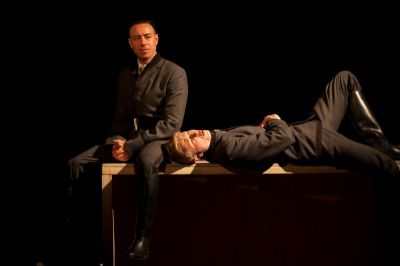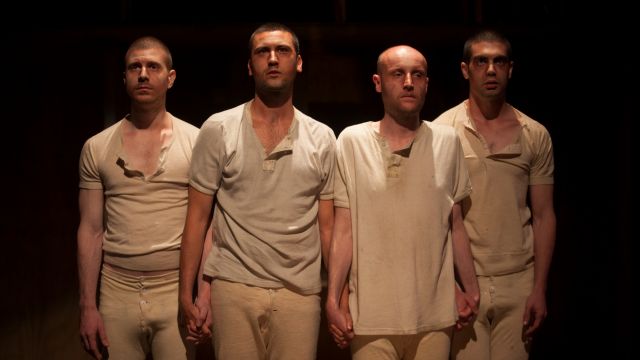Requiem for Dalinka
Possibly Requiem for Dalinka is a great play. The story, set in a fictional concentration camp in eastern Poland after the Nazi surrender, aspires to dramatise big and important questions of contemporary relevance, such as how far might we transgress in order merely to survive. What is the transformative role of music in survival? In what forms will repressed sexuality manifest itself? What happens to the individual when cruelty and brutality are just part of the job? In Dalinka camp, only four prisoners survive. They are Jewish musicians kept alive to ‘entertain’ their gaolers. The latter know they are finished: they cling to their beaten ideology, they fantasise, they despair.
The genesis of the play is the experience of Peter Marks’ mother, Eva, a Holocaust survivor, but the play is not her biography. Rather Mr Marks jumped off from there, wanting very much to ‘craft [the story] into something we could understand and make sense of in our own, individual ways’.
So why ‘possibly a great play’? Because, after the opening night performance, I can’t say whether it is or not. The reason is that two thirds to three quarters of the dialogue is indecipherable, beaten under an over-insistent, too loud sound design and lost in a very large space. Worse, the words are blurred by somebody’s decision that all characters speak with German accents. That added burden seems to make the actors anxious and, as a result, they gabble. The ‘Accent & Dialect Coach’, Geraldine Cook, hasn’t helped. Crucial speeches and interchanges, delivered by actors who appear to be excellent, become a distant burble, as if from a radio three rooms away. Lest anyone think that this is my particular hearing problem, a quick straw poll of audience members afterwards revealed that I am not alone.
I see from Deborah Rechter’s program note that the four Jewish prisoners are: a sensitive philosopher, a pragmatic medical student, a community organizer and a canny street smart operator. This is clearly important. These men are human beings, with flaws, and Jews of their time. Without the dialogue, they are four frightened man in dirty long johns. No doubt the Nazis are likewise individuated in the text.
This unfortunate aspect of things drags down a production which otherwise excels visually in cast, design and lighting. The set design by Jeminah Alli Reidy is simply brilliant and the more so for being so simple and so suggestive. An all-wooden structure provides a platform on which the Nazi guards can joke, carouse, listen to records or the music provided by the Jewish prisoners below and snatch some sex in the shadows. All that is above the cramped boxes that are the prisoners’ quarters. A steep set of steps to one side emphasises a descent into hell whenever a Nazi goes down to the prisoners. Smooth grey barrels represent the past – either the music of the past or its crimes to be hidden when the end is nigh. Benjamin Morris’ lighting design superbly complements Ms Reidy’s simplicity: the over-bright light above, the gloom of the prisoners’ quarters, the pools of searchlight at the perimeter in which hopes and dreams can be confessed.
 The musical excerpts – which can be heard – are carefully chosen. There’s an amusing moment when the Colonel’s aide puts on recording of Brecht’s Threepenny Opera. The Colonel rejects that – he doesn’t want that German music - and it’s replaced by The Magic Flute. When the prisoner musicians must play, we do not see them play, with instruments. We hear what they play and see the fear and stress of the player.
The musical excerpts – which can be heard – are carefully chosen. There’s an amusing moment when the Colonel’s aide puts on recording of Brecht’s Threepenny Opera. The Colonel rejects that – he doesn’t want that German music - and it’s replaced by The Magic Flute. When the prisoner musicians must play, we do not see them play, with instruments. We hear what they play and see the fear and stress of the player.
Less successful, perhaps, are the black and white film clips projected behind and above the set. It’s not clear whether these clips are a narrative device or whether they provide a contrast to our characters’ predicament. Anyway, they look a touch amateur – a stark contrast to the live action. We have seen too many newsreels of the real camps to buy these depictions; everything looks too modern and the people too well fed – and, by the way, why are Americans liberating a camp in Eastern Poland?
If we leave aside the audibility of the dialogue (would that we could), the show holds one’s attention due to Mr Pfeiffer’s startling mise en scène. This is a show that is constantly visually exciting in its groupings, its configurations and movements. In context, the precision of the direction and of the actors’ movements make, say, a lineup of the Jewish prisoners either threatening or chilling; it can suggest homosexuality close to the surface among drunken Nazis; or it can accentuate the vulnerability inherent in a tender moment.
Mr Pfeiffer is well served by his cast. I wish I could commend them individually, but such is the program layout and the lost dialogue, I can only list them: Steve Turner, George Lingard, Tim Wotherspoon, Luke Mulquiney, Grant Foulkes, Matt Furlani, Zak Zavod and – quite outstanding – Katya Shevtsov.
If Mr Pfeiffer were to decide to turn down the ‘sound design’ and persuade the actors to drop the German accents and speak clearly – this is a show that I would happily see – and review – again. It bristles with ideas and it is gripping to look at. What a damn shame the text is smothered.
Michael Brindley
Subscribe to our E-Newsletter, buy our latest print edition or find a Performing Arts book at Book Nook.

